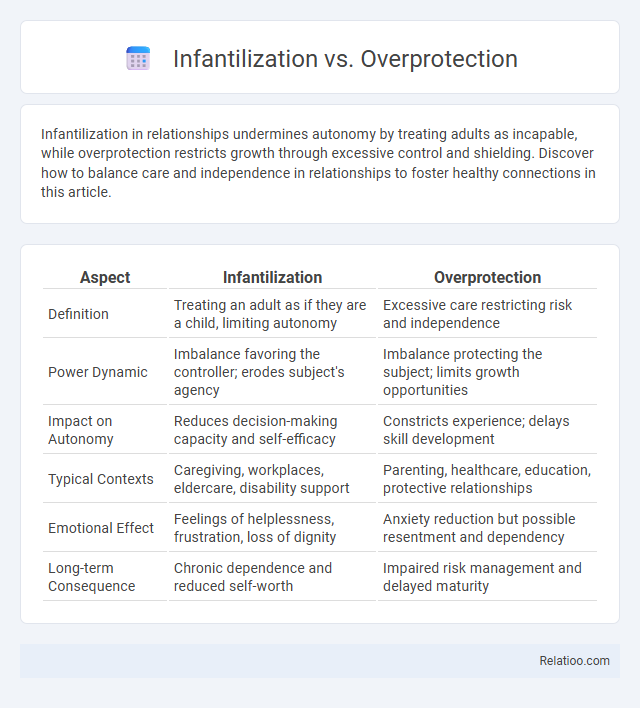Infantilization in relationships undermines autonomy by treating adults as incapable, while overprotection restricts growth through excessive control and shielding. Discover how to balance care and independence in relationships to foster healthy connections in this article.
Table of Comparison
| Aspect | Infantilization | Overprotection |
|---|---|---|
| Definition | Treating an adult as if they are a child, limiting autonomy | Excessive care restricting risk and independence |
| Power Dynamic | Imbalance favoring the controller; erodes subject's agency | Imbalance protecting the subject; limits growth opportunities |
| Impact on Autonomy | Reduces decision-making capacity and self-efficacy | Constricts experience; delays skill development |
| Typical Contexts | Caregiving, workplaces, eldercare, disability support | Parenting, healthcare, education, protective relationships |
| Emotional Effect | Feelings of helplessness, frustration, loss of dignity | Anxiety reduction but possible resentment and dependency |
| Long-term Consequence | Chronic dependence and reduced self-worth | Impaired risk management and delayed maturity |
Understanding Infantilization and Overprotection
Understanding infantilization involves recognizing behaviors that treat adults as if they are children, undermining their autonomy and competence. Overprotection refers to excessive sheltering that limits your ability to develop independence and make decisions, often stemming from fear or anxiety about potential harm. Both concepts restrict personal growth, but while infantilization dismisses maturity outright, overprotection stems from an intent to safeguard.
Key Differences Between Infantilization and Overprotection
Infantilization involves treating adults as if they are children, undermining their independence and decision-making abilities, while overprotection is characterized by excessive care or control aimed at preventing harm but can limit personal growth. Key differences lie in intent and impact: infantilization diminishes autonomy by assuming incompetence, whereas overprotection reflects a protective drive that can inadvertently stifle your ability to develop resilience. Recognizing these distinctions helps in fostering healthy boundaries that respect your maturity without compromising safety.
Psychological Roots of Infantilization
Infantilization stems from deep psychological roots, often arising from unresolved childhood trauma or attachment issues that lead caregivers to treat individuals as incapable or dependent. This behavior relates to overprotection, where excessive shielding limits autonomy, but infantilization specifically undermines self-efficacy by promoting helplessness. Understanding these dynamics reveals how infantilization impedes personal growth and fosters dependency through subtle, persistent psychological control.
The Impact of Overprotection on Development
Overprotection hinders Your child's emotional and social development by limiting opportunities for independent problem-solving and risk-taking, essential for building resilience. Excessive control can lead to increased anxiety, lower self-esteem, and delayed decision-making skills, fostering dependency rather than autonomy. Understanding the distinction between infantilization and overprotection highlights the importance of balanced parenting that encourages growth without undermining the child's capability.
Signs of Infantilization in Parenting and Caregiving
Signs of infantilization in parenting and caregiving include treating adults or older children as if they lack competence, making decisions for them without consultation, and limiting their opportunities for independence or self-expression. When you notice constant monitoring, excessive assistance with simple tasks, or dismissive attitudes toward their opinions, these behaviors undermine autonomy and confidence. Recognizing these signs is crucial to fostering growth and respect in caregiving relationships.
How Overprotection Limits Independence
Overprotection restricts your ability to develop essential life skills, leading to reduced independence and self-confidence. When caregivers excessively shield individuals from challenges, they inadvertently create dependency and hinder problem-solving capabilities. This excessive control contrasts with infantilization, where adults are treated as incapable, ultimately limiting personal growth and autonomy.
Consequences on Emotional Well-being
Infantilization, overprotection, and infantalization significantly hinder emotional well-being by fostering dependency and undermining self-confidence. These behaviors impede emotional growth, often resulting in feelings of frustration, anxiety, and low self-esteem among affected individuals. Prolonged exposure to such treatment can lead to difficulties in forming healthy relationships and managing stress effectively.
Strategies to Prevent Infantilization and Overprotection
Preventing infantilization and overprotection involves promoting autonomy by encouraging decision-making and self-care skills appropriate to the individual's age and abilities. Establish boundaries that respect your loved one's independence while providing support only when necessary, ensuring they feel empowered rather than controlled. Educate yourself on the differences between supportive guidance and overbearing behavior to foster environments where personal growth and confidence thrive.
Encouraging Healthy Boundaries and Autonomy
Infantilization, overprotection, and infantalization all undermine Your ability to develop healthy boundaries and autonomy by limiting decision-making and self-expression. Encouraging autonomy requires recognizing Your competence, allowing age-appropriate responsibilities, and fostering independent problem-solving skills. Establishing clear boundaries supports personal growth and resilience while preventing dependency that stifles development.
Empowering Growth: Moving Beyond Infantilization and Overprotection
Empowering growth involves fostering autonomy and resilience by moving beyond infantilization and overprotection, which often hinder personal development and self-efficacy. Infantilization, characterized by treating adults or adolescents as children, and overprotection, marked by excessive shielding from challenges, both limit experiences essential for building confidence and problem-solving skills. Emphasizing supportive guidance and opportunities for decision-making cultivates independence, helping individuals develop the competence necessary for navigating complex life situations.

Infographic: Infantilization vs Overprotection
 relatioo.com
relatioo.com